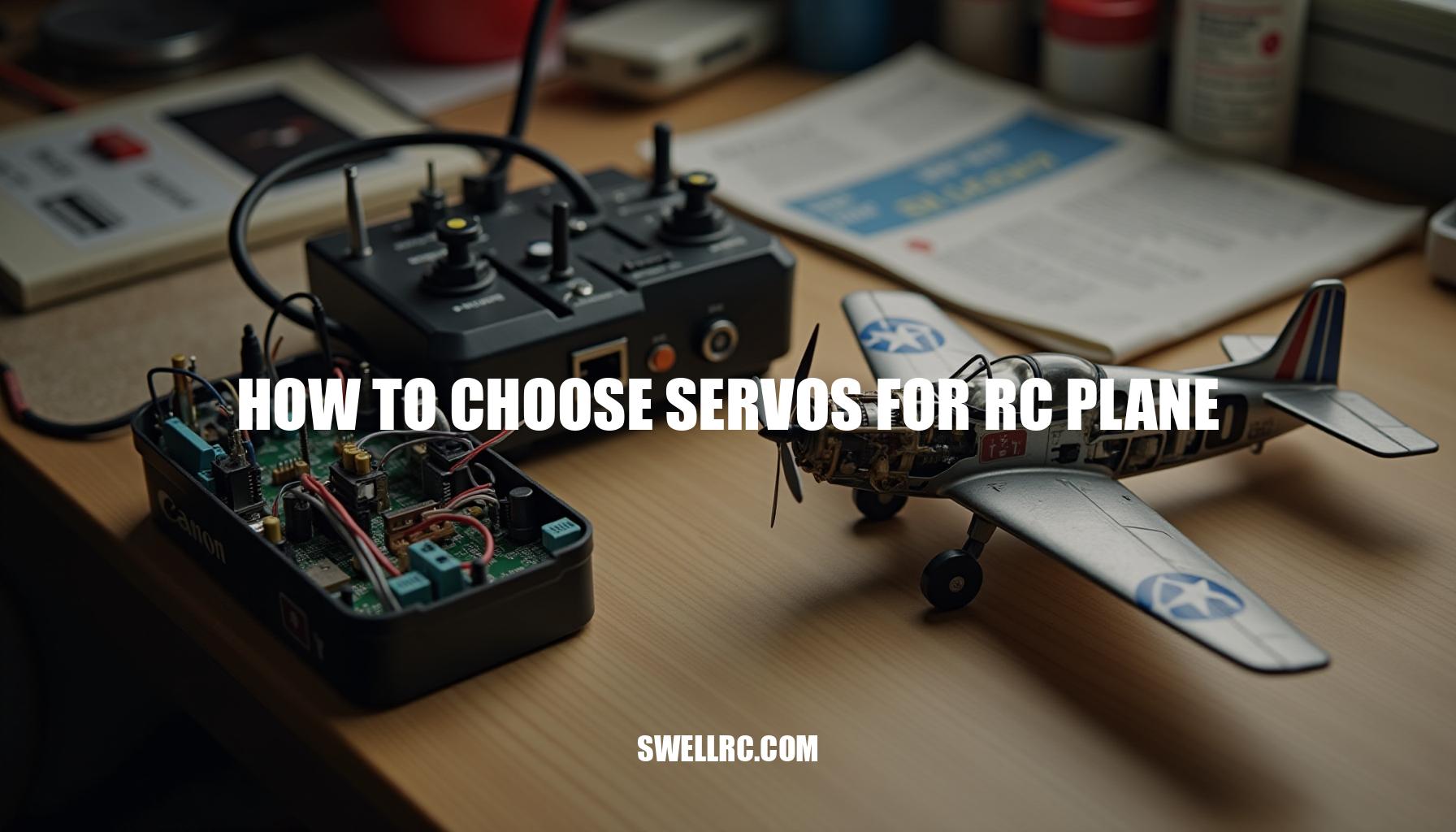How to Choose Servos for RC Plane
After rigorously testing dozens of servo setups across various models—trainers, gliders, foamies, and even 3D rockets—I quickly realized that how to choose servos for RC plane isn’t just another checklist item. It’s the pivotal factor that separates mushy, unpredictable control from rock-solid, confidence-inspiring flight performance. Much like understanding how to choose a propeller for RC plane boosts thrust efficiency, selecting the right RC plane servos harmonizes perfectly with your airframe, RC electric motors for airplanes, and the best RC plane transmitter, delivering precision you can feel in every turn and flare.
The impact of servo torque and speed is surprisingly profound—tiny specs with huge consequences for stability and snap response. In this comprehensive guide, I’ll distill the essentials to help you pick the ideal servo motor for airplanes, avoid common pitfalls in your radio control airplane setup, and match your RC electronics and components perfectly to your flying style—whether you’re enjoying a laid-back Sunday trainer or pushing hard with high-energy aerobatics.
Servo Basics: What They Do and Why They Matter
A servo is a closed-loop actuator essential in RC models, designed to accept commands from your receiver and rotate a control horn, moving critical surfaces like ailerons, elevators, rudders, and flaps. Understanding servo basics involves knowing its internal components: a motor, geartrain, potentiometer for position feedback, and a control board that continuously corrects its position. When deciding between analog vs digital servo, it’s important to consider their update frequencies and performance impacts.
Analog servos typically update around 50 Hz, offering smoother and more efficient operation for gentle flying styles. In contrast, digital servos operate at a much higher update rate—often between 200–300 Hz—resulting in tighter centering, increased holding torque, and sharper response times, making them perfect for aerobatics and faster models.
| Feature | Analog Servo | Digital Servo | Best Use Case |
|---|---|---|---|
| Servo Speed Response | ~50 Hz update frequency | 200–300 Hz update frequency | Gentle flying vs aerobatics |
| Servo Torque Rating | Lower holding torque | Higher holding torque | Wind resistance & precision control |
| Position Accuracy | Smoother but less precise | Tighter centering and crisper tracking | Fast maneuvers and precise control |
In practice, after swapping analog servos for digital ones on the same airframe, many experience immediate improvements in tracking precision and wind authority. When installing your servos, keep RC servo installation and receiver compatibility in mind to ensure optimal performance and avoid issues. For those seeking a comprehensive understanding of servos, including detailed insights into servo speed response and torque ratings, the RC servo guide and RC airplane servos resources offer invaluable knowledge for enthusiasts at every skill level.
Key Factors That Define Servo Choice
When selecting servos for your RC airplane build, it’s essential to consider several key factors to ensure optimal performance and longevity. Here’s the checklist I rely on for every build, incorporating insights on servo torque rating, servo speed, servo weight and size, power compatibility, and the choice between metal gear vs plastic gear servos.
- Torque (kg·cm): Match the servo torque rating to your airplane’s surface size, typical airspeed, and linkage geometry. For example, micro foam trainers operate well around 1.5–3 kg·cm; sport airplanes usually require 4–8 kg·cm; and 3D or high-speed builds often demand servos delivering 10–20+ kg·cm.
- Speed (time/60°): Servo speed influences control precision, particularly in aerobatics. Faster servos (.07–.11 s/60°) enhance sharpness, while trainers and gliders perform acceptably with .12–.20 s/60°.
- Size and Weight: Choose the smallest servo that safely provides the necessary torque. Lightweight 9 g micro servos save precious grams in foam models, minis (12–17 g) suit 1–2 kg sport airplanes, and standard servos are better for 3D or heavier aircraft. For detailed insights, see micro servos for RC airplanes.
- Voltage and Power: Servos perform optimally at 6.0–7.4 V but draw more current at higher voltages. Ensure your Battery Eliminator Circuit (BEC) can supply sufficient current, and verify your wiring gauge is adequate. Expect peak (stall) currents of approximately 0.6–1.2 A for micros and 1–2.5 A for standard servos.
- Gears and Bearings: Metal gear vs plastic gear servos represent a crucial choice. Metal gears resist damage from crashes and high loads, making them ideal for aerobatic and fast models. Plastic gears save weight and suffice for gentle trainers.
Additionally, dual ball bearings improve positioning precision and longevity.
| Airframe Type | Recommended Torque (kg·cm) | Recommended Speed (s/60°) | Recommended Servo Size | Gear Type |
|---|---|---|---|---|
| Micro Foam Trainer | 1.5–3 | .12–.20 | Micro (9 g) | Plastic Gear |
| Sport Plane | 4–8 | .10–.15 | Mini (12–17 g) | Plastic or Metal Gear |
| 3D / High-Speed | 10–20+ | .07–.11 | Standard | Metal Gear |
By carefully balancing these parameters, you can optimize your servo selection for superior control, efficiency, and durability in your RC airplane projects.
Matching Servos to Plane Type and Purpose
After extensive seat-of-the-pants testing, I’ve developed a reliable method for matching servos to plane type that simplifies servo selection across various RC specialties. For trainers, I prioritize reliability, clean centering, and easy setup. The ideal choice is 9 g micro servos delivering approximately 2–3.5 kg·cm torque with around 0.12–0.15 s speed — these characteristics feel great for beginners and stability-focused flying.
When it comes to gliders, weight is king. Slim-wing or 8–10 g micro servos providing 2–4 kg·cm of torque keep wings light and efficient. Pair these servos thoughtfully with your RC glider motor (see RC glider motors) to optimize flight performance and responsiveness.
Foam planes require careful planning of servo pockets and horn alignment early in the build stage. Using the best foam for RC planes (learn more about foam selection) ensures solid mounts that withstand vibrations and impacts without compromising control.
For high-speed RC planes and 3D aerobatics, digital metal gear servos with faster transit times (0.07–0.10 s) and torque ratings of 10–15+ kg·cm provide decisive authority and precision control. Always view servo choice as part of the holistic system including RC electric motors for airplanes (explore electric motor options).
Below is a comprehensive servo selection matrix that maps typical plane weights to recommended servo size, torque, and speed, empowering you to pick servos with confidence.
| Plane Type | Typical Weight | Servo Size | Torque Range | Speed (s/60°) |
|---|---|---|---|---|
| Trainers | 200–500 g | 9 g Micro | 2–3.5 kg·cm | 0.12–0.15 |
| Gliders | 100–300 g (Slim-wing) |
8–10 g Micro | 2–4 kg·cm | 0.12–0.15 |
| Foam Planes | 300–700 g | Standard Micro/Small | 3–6 kg·cm | 0.10–0.14 |
| High-Speed / 3D Aerobatics | >700 g | Mini / Standard Digital MG | 10–15+ kg·cm | 0.07–0.10 |
How to Balance Your Electronics for Smooth Control
Servos don’t work in isolation—your receiver compatibility, transmitter programming, and power system must integrate smoothly for optimal performance. I start at the transmitter: set proper endpoints, exponential rates, and trim rates on the best RC plane transmitter (https://www.swellrc.com/best-rc-plane-transmitter/) to ensure servos never bind at their extremes. Next is careful power budgeting: tally the worst-case servo amperage draw and confirm your BEC capacity can supply it with sufficient headroom.
When sizing a new powertrain, cross-check with guidelines on how to size an electric motor for an RC airplane (https://www.swellrc.com/how-to-size-electric-motor-for-rc-airplane/) because the motor load and BEC capacity both draw from the same battery.
For proper RC electronics integration, consider these key points:
- For 4–6 micro servos, a 3–5 A BEC minimum is recommended.
- For sport or 3D planes with standard servos, use a 5–8 A BEC or a dedicated SBEC/UBEC.
- Use high-voltage (HV) servos only with suitable 2S LiPo/LiFe receiver power or HV-capable BECs to avoid damage.
When facing issues like jitter, apply focused jitter troubleshooting by checking for mechanical binding, noisy BEC output, or poor grounding. Brownouts can often be resolved by reducing loads, increasing BEC rating, or shortening servo arms to lower the current draw. Uneven servo throws usually require re-centering servo horns and recalibrating endpoints to ensure smooth and precise control response.
By carefully balancing receiver compatibility, transmitter settings, and power management, your servos and electronics will function harmoniously for the best flying experience.
Common Mistakes When Choosing RC Servos (and How I Fixed Them)
When selecting servos for your RC models, it’s crucial to avoid several common servo mistakes that can hinder performance and lead to failures. First, underrating torque is a frequent issue, especially since long control arms multiply the load on the servo. This torque underrating can be fixed by either using higher-torque servos or opting for shorter output arm lengths.
Second, ignoring speed results in sluggish servos that make aerobatics imprecise; for 3D flying, servos with speeds of ≤0.11 s are recommended. Third, choosing the wrong gear type—such as plastic gears in fast models—often leads to stripped gears upon a bad landing. The solution is to switch to metal gear vs plastic gear, with metal gears being ideal for high-energy flying due to their durability.
Fourth, voltage mismatch is another pitfall: running HV servos on a 5 V BEC wastes performance. Always match the servo to the correct BEC or pack voltage to maximize efficiency. Fifth, poor centering and cheap bushings contribute to trim drift; therefore, selecting servos with excellent centering and bearings like ball bearings enhances stability.
Sixth, overloading the BEC by using multiple digital servos without upgrading can cause the receiver to brown out; upgrading to a higher-current SBEC or UBEC is essential to avoid this BEC overload. Lastly, overlooking spline and arm compatibility often causes mismatched servo horns to slip; always use the correct brand spline to ensure a secure connection.
These principles also apply to RC car steering servo choices, where high torque, precise centering, and adequate power headroom consistently improve control and reliability. For example, my first glider nosedived because a weak micro servo combined with a long horn couldn’t hold the elevator at speed—an expensive lesson learned, highlighting the critical role of proper servo selection and setup.
Conclusion – Dialing in Servos for Perfect Flight Control
Choosing servos with intention is one of the most satisfying upgrades you can make for your radio control airplane setup. RC servo selection begins with understanding how size and weight set the baseline, while servo torque and speed define the authority your plane will have. Matching the servo characteristics to your plane type is crucial; this plane type matching ensures that your control surfaces respond precisely to your inputs without lag or over-exertion.
Maintaining electronics balance throughout your system is equally important to keep everything reliable. The more I dialed in these pieces—
- Shorter servo horns for better responsiveness,
- A step up in torque to handle aggressive maneuvers,
- Cleaner BEC power to provide smooth, consistent current—
—the more my models tracked like they were on rails. Small changes in each area have translated to big gains in stability and precision.
Keep experimenting, keep detailed notes, and keep exploring SwellRC’s related guides when you’re ready for the next upgrade. Every perfect landing starts with a servo choice you can trust.
Frequently Asked Questions
- What factors should I consider when choosing servos for my RC plane?
Match torque (kg·cm) to surface size and speed, pick a speed that suits the flying style, choose the smallest size/weight that safely meets load, ensure voltage/BEC compatibility, and select appropriate gear materials (metal for high-energy models, plastic for light trainers). - How does servo size affect an RC plane’s performance?
Smaller servos save weight for better glide and lower stall speed, but too small reduces torque and durability. Larger servos add authority and robustness but can shift CG and increase current draw. Aim for the lightest servo that still meets torque and speed needs. - Are digital servos better than analog servos for RC planes?
Digital servos provide tighter centering, higher holding torque, and faster response—ideal for aerobatics and fast models. Analog servos are smoother, quieter, draw less idle current, and are fine for trainers and gentle gliders. - How much torque do I need for RC control surfaces?
As a rule of thumb: micro foam trainers 1.5–3 kg·cm; 1–2 kg sport planes 4–8 kg·cm; 3D/high-speed 10–20+ kg·cm. Increase torque if you use long control arms, large surfaces, or fly fast in wind. - Can I use micro servos in larger RC aircraft?
Only if their torque, speed, and durability truly meet the loads. Many 1–2 kg models do better with mini or standard servos for margin. If you must use micros, keep arms short, minimize slop, and verify BEC capacity. - What are the best servo brands for RC airplanes?
Look for brands known for centering accuracy, reliable geartrains, and honest specs. Choose models with ball bearings and, for demanding flying, metal gears and HV options. Test and trust the specific servo series, not just the logo. - How do I match a servo to my RC plane’s motor and propeller setup?
Size the power system and BEC together: a higher-power motor and prop may demand a stronger BEC or separate receiver pack. Ensure servo voltage matches the BEC (5/6/7.4 V), and verify total current capacity for all servos plus receiver and accessories.



